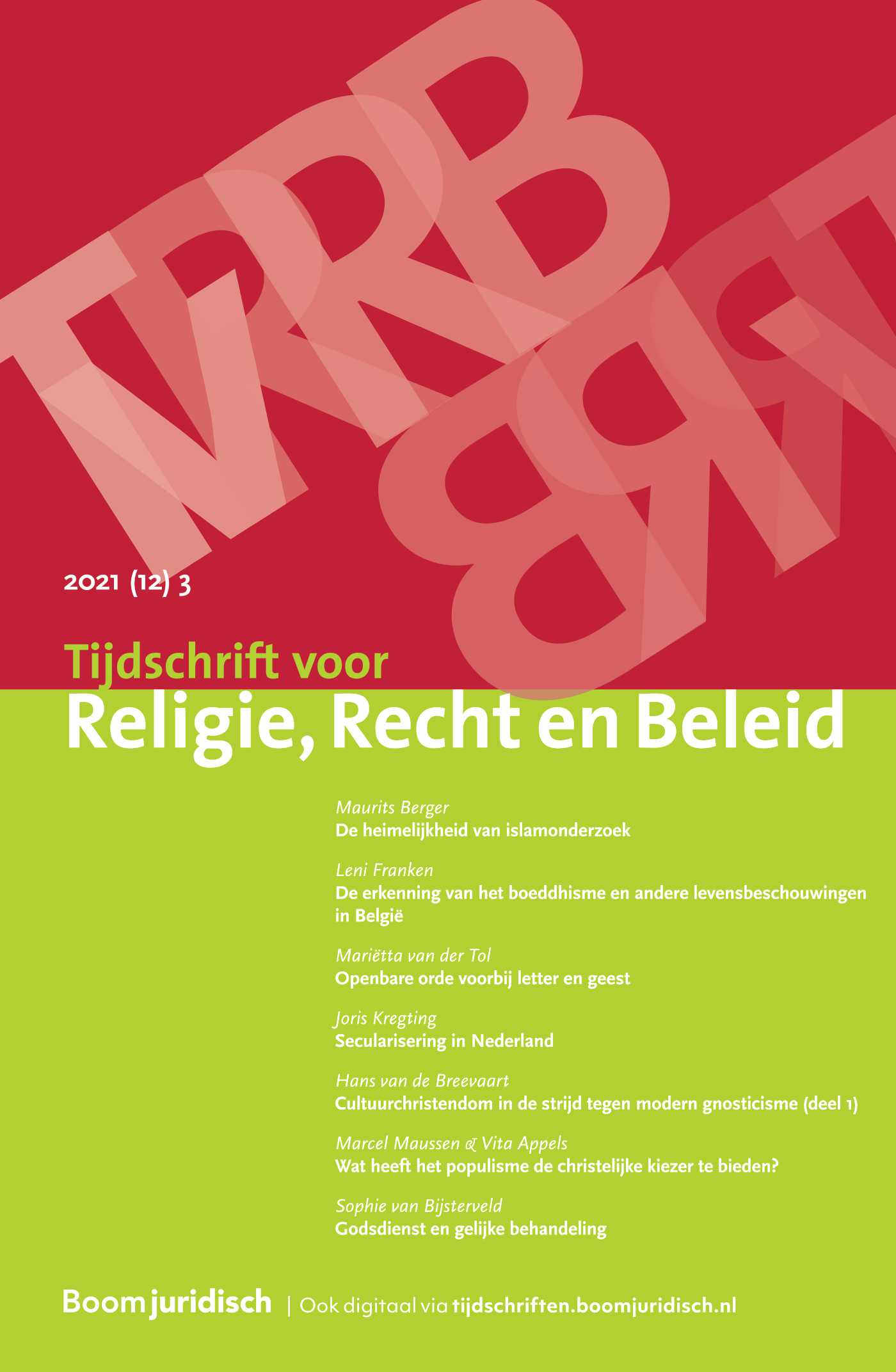|
The worldwide ‘lockdown’ due to Covid-19 has had an accelerating effect on the ongoing discussion of Islamic burial in the Netherlands. Because of the closure of airspace Moroccan and Turkish-Dutch deceased could no longer be repatriated to be buried in their country of origin. This increased the pressure on cemeteries in the Netherlands to provide for the requirements and rituals of an Islamic burial. And this in turn showed the importance of the discussion that is already taking place in the House of Representatives about changes to the laws and regulations concerning burials. These three dimensions of Islamic burial in the Netherlands – personal, practical and legal – are discussed in this article. |


Tijdschrift voor Religie, Recht en Beleid
Meer op het gebied van Algemeen
Over dit tijdschriftMeld u zich hier aan voor de attendering op dit tijdschrift zodat u direct een mail ontvangt als er een nieuw digitaal nummer is verschenen en u de artikelen online kunt lezen.
| Overwegende ... |
Het nieuwe denken over racisme |
| Auteurs | Dr. Marcel Maussen |
| Auteursinformatie |
| Artikel |
|
| Trefwoorden | islamitisch begraven, islamitische rituelen, islam in het Westen, Wet op de lijkbezorging, Covid-19 |
| Auteurs | Dr. mr. Khadija Kadrouch-Outmany |
| SamenvattingAuteursinformatie |
| Artikel |
Over gewetensbeslissingen en het probleem van subjectiviteit bij rechterlijke oordeelsvorming |
| Trefwoorden | rechterlijke beslissing, Geweten, Subjectiviteit, Objectivering, Motivering |
| Auteurs | Mr. dr. Tom van Malssen |
| SamenvattingAuteursinformatie |
|
This article delineates the problem of judicial subjectivity in so-called ‘hard cases’. Decisions in such cases are essentially decisions of conscience, which in principle can escape the control mechanisms of objectivation and justification. This leads to the question as to the attributes of a good judge. |
| Artikel |
Kerkelijk dienstrecht en civiel arbeidsrecht volgens NGK/Gort |
| Trefwoorden | art. 2:2 BW, eigen statuut, kerkelijk dienstrecht, rechtspositie geestelijke, fundamenteel dwingend recht |
| Auteurs | Mr. dr. Pieter Pel |
| SamenvattingAuteursinformatie |
|
The judgment ‘NGK/Gort’ from the Supreme Court of the Netherlands (04-10-2019, ECLI:NL:HR:2019:1531) gives an important explanation about the church-state relation in general and the ecclestiacal service law-position concerning the pastor in particular. The legal starting point is not in civil law, but in church law. This is the consequence of the right of selfregulation (autonomy) of the church and the non-interference from the state, as recognized by article 2:2 Dutch Civil Code and article 9 jo. 11 ECHR. This principle stands against normal civil mandatory law, for example labor law. It will only be overruled in exceptional cases by civil law of fundamental nature. Than a judicial consideration is necessary taking into account the fundamental rights of the church and the opposant. |
| Artikel |
Biechtgeheim in de verdrukking? |
| Trefwoorden | Ambtsgeheim, geestelijke verzorging, vrijheid van godsdienst, katholieke kerk, strafrecht |
| Auteurs | Dr. Ad van der Helm |
| SamenvattingAuteursinformatie |
|
Confessional secrecy is inviolable under Catholic canon law, and violations of it are severely sanctioned. Some people see this secret as an obstacle to the legal process in society and advocate a limitation in its use. This article argues that this form of confidentiality also can be defended in civil law because of the protection of spiritual care. Confessional secrecy is analyzed here and compared with forms of official secrecy that are recognized in society. Finally, there is a plea for a clear legal framework for the application of this confessional secret by Catholic priests. |
| Artikel |
Hoedemakers rol bij de val van het kabinet-Kuyper |
| Trefwoorden | Hoedemaker, kabinet-Kuyper, theologische faculteiten, protestantse natie |
| Auteurs | Dr. Jurn de Vries |
| SamenvattingAuteursinformatie |
|
The election defeat of the Christian coalition in 1905 is partly caused by contradictions in its own circle. Many orthodox members of the Dutch Reformed Church resented Prime Minister Abraham Kuyper for having legally regulated the position of the Free University at Amsterdam, but had done nothing for the rights of the Dutch Reformed Church in the theological faculties at the universities of the state. The reformed theologian Hoedemaker even aroused a preference for a liberal rather than an anti-revolutionary candidate. Kuyper’s party lost nine seats, the coalition lost three seats to the majority. |

